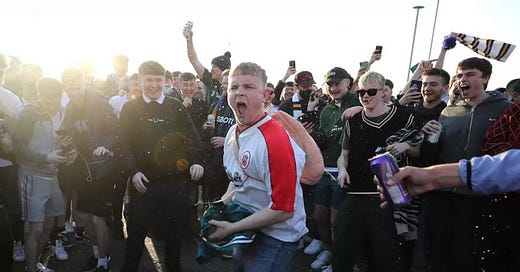Something a little different as a bonus. This article was actually written for my 9 to 5 job, where I blog about financial, business, crypto and stock news. It had some significant cross-over, so I felt it would be a good bit of bonus content here.
They say that money runs the world.
And, it’s true. If you want to understand the motivation of pretty much any business decision, just follow the money.
A company lays off 500 staff? It’s probably to increase the valuation. Same company hires them back? They need to increase production so they can, you guessed it, make more money.
So, as football fans try to wrap their head around the news of the 12 most famous and successful clubs in Europe joining forces to create a European Super League, it is best to remind yourself of that simple truism.
Why are they doing this, and throwing the entire football world in turmoil because of it?
Money. Lots and lots of money. The most popular clubs in the world’s most popular sport are looking to cash in. Simple as.
The only question about this project is if they will. That’s less certain -- and we’ll come back to why in a minute – but let’s first have a look at what exactly they are proposing here:
The 12 biggest brands (and I’m using the word “brands” purposely here as there are clubs that deserve to be in this list for sporting reasons that are excluded for commercial purposes) have announced that they will be forming a competition, to begin this fall, that will run parallel with the existing leagues and Champions League. Those clubs are: Arsenal, Chelsea, Liverpool, Manchester City, Manchester United, Tottenham, AC Milan, Inter Milan, Juventus, Atletico Madrid, Barcelona and Real Madrid.
They have suggested that as many as eight more teams will join them down the road. So far, there are no German or French teams listed, which likely means Dortmund, Bayern Munich and PSG are being held spots, with five other spots TBD.
The whole thing would be financially backed by JP Morgan (NYSE: JPM) with $4.2 billion USD in prize money up for grabs. Reaction to the announcement in the market was fairly muted, with JPM only down marginally from an open at $153.57 to $152.50. The only club from that list that is publicly traded, Manchester United (NYSE: MANU) saw some marginal gain -- $16.17 to $17.26. (Note: I decided to leave this is as it’s a taste of what I do during the day and it might be of interest to some. Don’t expect stock numbers on here regularly, however)
The reaction from fans and football officials was not muted at all. It’s was apocalyptic. Leagues threatened to kick them out. Officials said any players that play in the competition would be banned from playing in the Euro and World Cup. Fans, meanwhile, threatened to pull their support.
It’s that latter point that the clubs involved should fear the most and will dismiss the easiest. Fans are viewed as being irrationally attached to the clubs they support. They won’t possibly pull their support, is the thinking. So, if you can rely on the millions of fans that you already have to reliably buy your product (in the form of tickets and merchandise) then you feel safe disrupting the system in this way. You have nothing to lose, and much to gain.
But, the fans are really mad right now. These clubs would be best to at least give a passing thought to the idea that they won’t be automatically attracted to the project.
Sports is a unique business. It relies on a social contract between the fan – the consumer – and the club. If the fans don’t believe what you are doing matters, or that you represent them, then the whole system collapses. Let’s face facts – 22 guys in short pants chasing a ball doesn’t actually matter. It’s only because of the meaning that fans attach to it that it becomes a commodity that can create billions of dollars in revenue.
These clubs may be right. They may be able to rely on the fans coming around to the idea of this Super League. But, make no mistake. It’s a gamble.
The question they should ask themselves is whether it’s a gamble they need to make.



